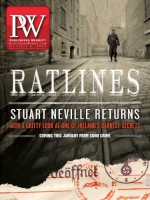David Nasaw didn’t plan to write biographies, he says, sitting in his office in the history department at the City University of New York Graduate Center. By the time he began his book on William Randolph Hearst in the mid-1990s, he had already written histories of American public amusements and public schools, as well as a book called Children of the City.
Whatever his intentions, The Patriarch: The Remarkable Life and Tumultuous Times of Joseph P. Kennedy (Penguin Press), marks Nasaw’s third biography of a titanic public figure, following Hearst and Andrew Carnegie. “I wrote about Hearst because I wanted to write about politics, the media, and money—and what better way than to tell the story of one of the richest men in America, who owned the largest media empire and wanted to be president,” Nasaw explains. “With Carnegie, I was fascinated by the coming of the Industrial Revolution to the United States and the birth of philanthropy.”
He continues: “With Joe Kennedy, I wanted to explore the viewpoint of someone who had a very different vision of how America should move out of the Depression and into the 20th century, who thought that America shouldn’t be in a world war and then a cold war, that America should retreat and not spend millions on the military-industrial complex. I think one thing historians don’t do enough of is look at the other paths that might have been taken. History is not a straight line where everything is predestined. I think historians have to examine the difficult choices people like FDR made, and the way to do that is to write about alternate paths and alternate histories.”
The most striking example of Kennedy’s very different vision of America’s proper path is his famously disastrous tenure as U.S. ambassador to Great Britain, during which he wholeheartedly advocated appeasing Hitler and, once WWII began, argued that England could not withstand the Nazis and America should stay out of it. These three years—1938, 1939, 1940—occupy a quarter of The Patriarch’s text because, says Nasaw, “They were the centerpiece of his life. The story of Joe Kennedy is the story of an outsider, an Irish Catholic from East Boston, who struggles all his life to become an insider, and every time he does, whether it’s in Hollywood or Wall Street or Washington, he finds it impossible to be a team player.
“The pinnacle of his success, when he becomes the only Irish Catholic ever to be named ambassador to the Court of St. James, marks an amazing ascension to status, to acclaim, to being at the center of international power. What’s remarkable is how quickly he messed up, how he went from being one of the most popular, best-respected men in Washington—the first chairman of the SEC, who crafted the financial regulations he believed were necessary to save capitalism and democracy—to being one of the most distrusted and disliked men in American public life.”
Kennedy is most famous today, of course, for the political dynasty he founded, and while that might lead readers to expect a biography revealing the stern, demanding patriarch of the title, Nasaw paints a warm portrait of a supportive, loving father. “In my talks with Senator [Edward] Kennedy, Jean Kennedy Smith, and Eunice Shriver, they spoke of their father with such love,” says the author. “You could tell it wasn’t put on; they knew this guy, they knew where the warts were, and they loved him. Kennedy was in some ways a pioneer in modern fatherhood. I’ve studied a lot of strong men, and there is no one I know who was as powerful personally and politically, as much of a public figure as he was, and yet was also able to raise children who went off in all sorts of different directions and all made a mark in public life. One of the joys for a historian or biographer is finding something about your topic that you didn’t expect when you began doing research.”
Wendy Smith, a contributing editor for the American Scholar, reviews books and profiles authors for the Washington Post, the Daily Beast, AARP, and other publications.



 Volume 259
Issue 40
10/01/2012
Volume 259
Issue 40
10/01/2012





